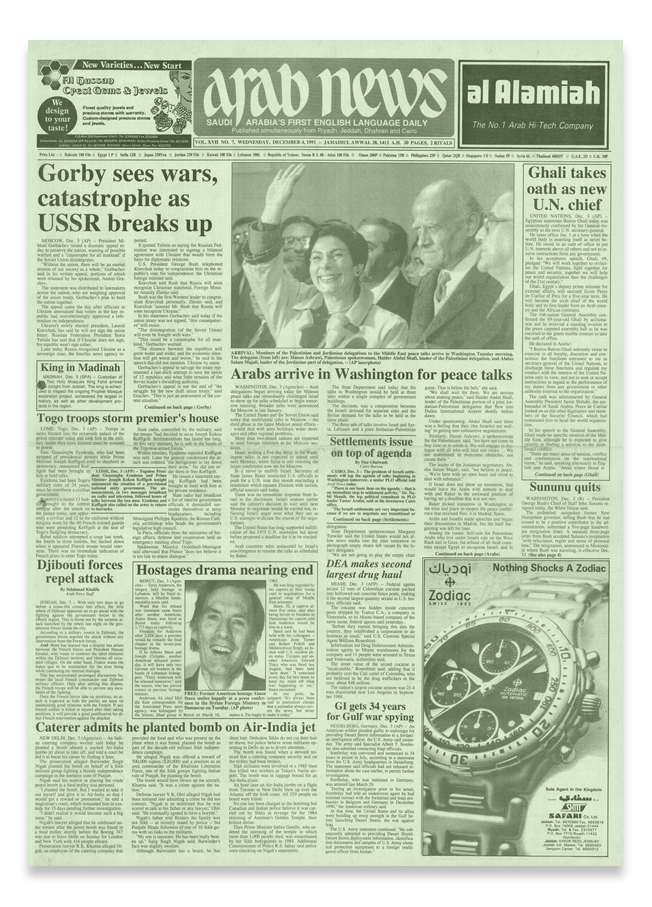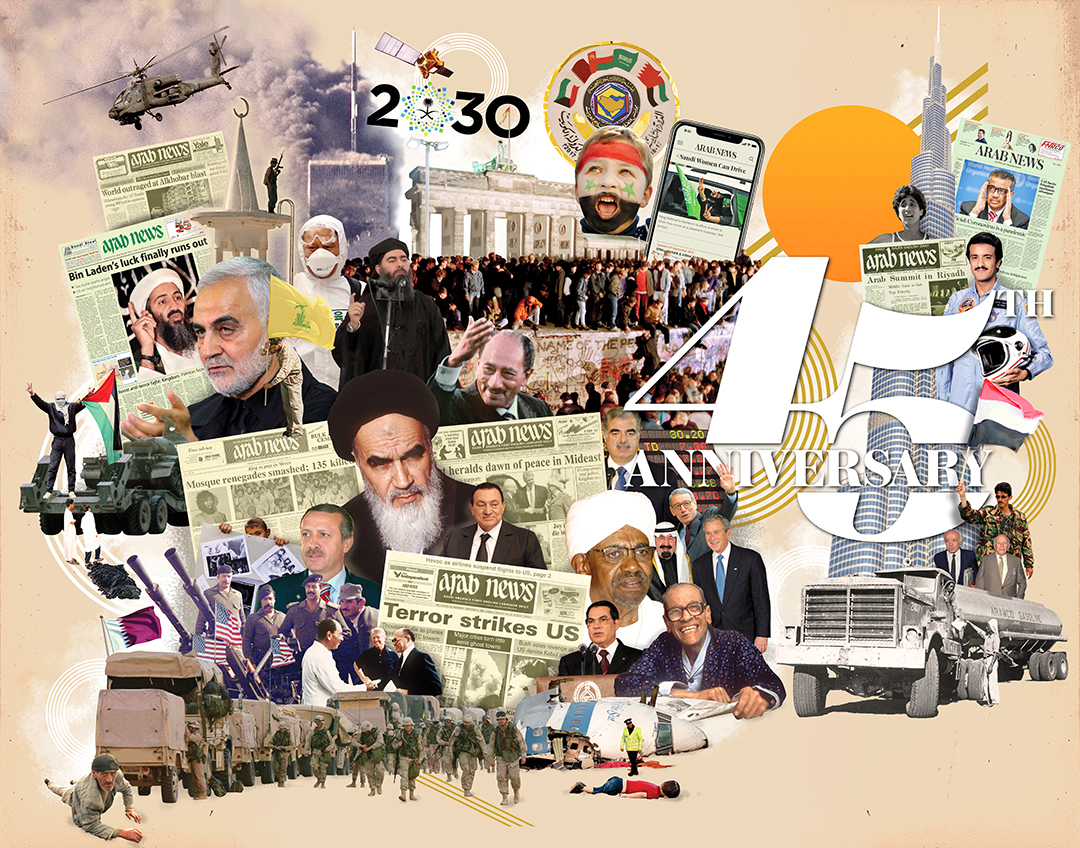Serving from 1992 to 1996, the Egyptian diplomat was the only Arab to assume the role
Summary
On Dec. 3, 1991, the Egyptian politician Boutros Boutros-Ghali was appointed the sixth secretary-general of the United Nations and the first person from the African continent to hold the post. He was elected by the Security Council after beating off competition from 14 other candidates.
Earlier in his career, Boutros-Ghali had played a prominent negotiating role in the Camp David Accords orchestrated by US President Jimmy Carter, which led to the signing of a peace treaty between Egypt and Israel in 1979.
But repeated clashes with the US became the overriding theme of Boutros-Ghali’s five-year term as secretary-general of the UN, which coincided with a number of challenging crises, chiefly in Yugoslavia, Rwanda and Somalia, that cast doubt over the effectiveness of the organization.
Although with the support of 14 of the 15 members of the UN Security Council, Boutros-Ghali ran unopposed for re-election in 1996, a US veto meant he became the first sitting secretary-general to be denied a second term.
CAIRO: Perhaps no Egyptian diplomat of the second half of the 20th century enjoyed the fame and international status of Boutros Boutros-Ghali. He is the only Arab to assume the role of secretary-general of the UN, with his term lasting from 1992 to 1996.
In Egypt today, the name of Boutros-Ghali is often recalled amid the crises the country is now facing, especially regarding the Grand Ethiopian Renaissance Dam issue. The Egyptians, including the simplest of them, know very well that he was the Egyptian official who was most associated with African countries in the country’s history. Even his nomination for the office of secretary-general of the UN was primarily supported by a number of African countries.
Boutros-Ghali is one of the most prominent political figures in the history of modern Egypt. His fame went from local to global. The UN faced major worldwide challenges during his term as secretary-general, which coincided with radical transformations on the world scene and was accompanied by the collapse of the Soviet Union, the end of the Cold War, and the start of the unipolar era and US hegemony. The period also saw the repercussions of the Gulf War, the break-up of Yugoslavia, and the Rwandan genocide.
During his term, Boutros-Ghali successfully developed the working mechanisms of the organization and the means of its interference in conflicts to mitigate them and resolve disputes through peaceful means. He developed a concept for preventive diplomacy and peacemaking efforts, as well as attempting to preserve peace and then support it after conflict ended.
It is no secret to those close to Boutros-Ghali that not being named foreign minister made his heart heavy all his life.
Dr. Abdellatif El-Menawy
Boutros-Ghali was born in Cairo on Nov. 14, 1922, to a Coptic family. His paternal grandfather, after whom he was named, was the prime minister of Egypt from 1908 until he was assassinated in 1910. His maternal grandfather, Mikhail Sharobim, was an important historian and author of “The Ample Guide to the Ancient and Modern History of Egypt.” Boutros-Ghali said in a press interview: “I was born in a family linked to government bodies from the beginning.” Most of his family was associated with the Ministry of Foreign Affairs.
He first assumed the position of acting foreign minister in 1977, succeeding Ismail Fahmy, who resigned from the role following President Anwar Sadat’s peacemaking visit to Jerusalem. Boutros-Ghali was reinstated to the position in 1978-79 to succeed Mohammed Ibrahim Kamel, who disagreed with Sadat for similar reasons to Fahmy and quit on the eve of the signing of the Camp David Accords.
Key Dates
-
1Boutros Boutros-Ghali is born in Cairo.
-
2Accompanies Egyptian president Anwar Sadat on historic visit to Jerusalem.

-
3Serves as Egypt’s minister of state for foreign affairs.

-
4Attends the Camp David summit as negotiator in the accords signed by Egypt and Israel.

-
5Appointed secretary-general of the UN.
-
6Begins five-year term as secretary-general of the UN.

-
7The UN-mandated “Black Hawk Down” raid in Mogadishu, Somalia, leaves 19 US troops dead. Boutros-Ghali is blamed by the US for the failure of the mission.

-
8Denied second term as secretary-general of the UN by US veto.
-
9Publishes memoir “Unvanquished: A US-UN Saga,” describing his five-year battle with Washington and blaming the “two-faced, arrogant” US for UN failures.
-
10Boutros-Ghali dies, aged 93, in Cairo.

Boutros-Ghali remained in his role under Hosni Mubarak’s rule and held several other positions, including deputy prime minister, minister of state for immigration, and deputy foreign minister for several months before he became secretary-general of the UN for one term, amid strong opposition from the US.
Despite his career in the Egyptian Foreign Ministry, he only assumed the role of minister of state for foreign affairs and was never named foreign minister. It is no secret to those close to Boutros-Ghali that not being named foreign minister made his heart heavy all his life, even though one of the nicknames the Egyptians gave him was “the father of popular diplomacy.”

“In his speech to the General Assembly, Ghali made no specific mention of the Middle East, although he is expected to give priority to finding a solution to the Arab-Israeli conflict.”
From an AP story on Arab’ News front page, Dec. 4, 1991
Boutros-Ghali was elected to the post of UN secretary-general in 1991 and faced great difficulties during his tenure. He wrote about these difficulties in his book, “Five Years in a Glass House,” in which he revealed many hidden matters, including America’s role in the crises that swept the world at that time.
His book also shed light on his souring relationship with Washington, which he described as being content with loud external positions, while pushing the UN into raging battles without providing it with real power or the necessary funds. This souring relationship ultimately cost him his role. In 1996, 10 UN Security Council members, including Egypt, Guinea-Bissau and Botswana, tabled a resolution calling for the extension of Boutros-Ghali’s term for five more years. Fourteen of the 15 members supported the resolution, but the US used its veto and he was forced to leave the most important international organization in the world.
Boutros-Ghali explained that there were several reasons for the US veto against his nomination for a second term, including political pressures related to the 1996 US presidential election, disagreements between the US and UN over issues like the Bosnian War and the Rwandan genocide, and tensions over the outstanding dues of the US to the UN.
After leaving the UN, Boutros-Ghali headed the Organization Internationale de la Francophonie as its first secretary-general. He also chaired Egypt’s National Council for Human Rights, before resigning in February 2011 following the outbreak of the Jan. 25 events and the departure of Mubarak.

A page from the Arab News archieve showing the news on Dec. 4, 1991.
When the state in Egypt decided to establish the National Council for Human Rights in 2003, it could not find a more worthy and prominent Egyptian figure to head it. He had all the required qualities and was chosen to head the council from its foundation until 2011. He was reappointed in 2013 as the honorary president of the council.
Among Boutros-Ghali’s stances that Egyptians remember the most was when they overthrew the Muslim Brotherhood and he wrote to Ban Ki-moon, the UN secretary-general at the time, saying: “What happened in Egypt on June 30, the day that saw protests demanding the removal of Mohammed Morsi, was a full-fledged revolution, during which a fascist regime in a religious guise was eliminated.”
Boutros-Ghali wrote in his message that the role of the UN, with all its mechanisms and components, is to “achieve international peace and security and cooperation between states,” and that what it produces must seek to “fulfill its principles and charter to serve peace, security and justice, and fight terrorism.” He also wrote that “the people of Egypt revolted to eliminate a fascist regime that had a religious guise and worked to divide society in favor of one faction at the expense of all the other people.” He added that the people of Egypt also revolted “to eliminate a regime that deepened discrimination.”
Boutros-Ghali passed away on Feb. 16, 2016, at the age of 93, in a hospital in Cairo after a fight against illness. He was preparing to travel abroad in a UN air ambulance, which had arrived to transport him from Cairo to Paris to complete his treatment and undergo urgent surgery. However, his fate was to pass away in Cairo, holding on to it until the last breath, as if Egypt refused to let his soul leave its lands — out of loyalty to him and in appreciation for his time and effort. He dedicated his life to Egypt from a young age.
Egypt bade him farewell at a military funeral, with prayers led by Coptic Pope Tawadros II and attended by President Abdel Fattah El-Sisi and other state officials. He was buried in St. Peter and St. Paul’s Church in Cairo’s Abbassia district.
- Dr. Abdellatif El-Menawy, a columnist for Arab News, first met Boutros Boutros-Ghali in 1983. El-Menawy had just begun his career as journalist at “Al-Majalla” magazine; Boutros-Ghali was the Minister of State for Foreign Affairs. By the meeting’s end, a long-standing professional relationship was born. Twitter: @ALMenawy















